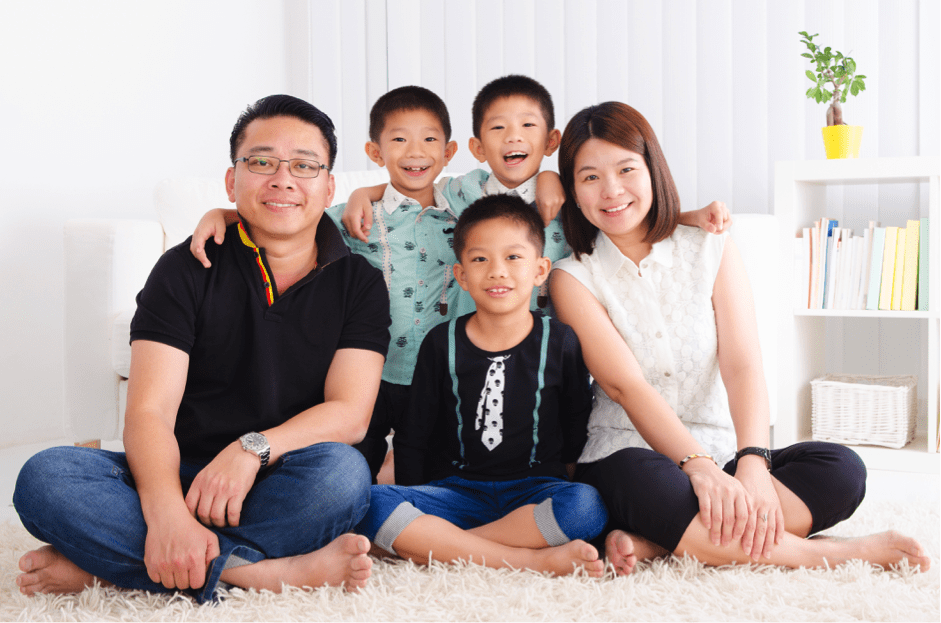
My interest in twins has spanned my whole life as I was born a younger sibling of identical twins, explains Dr Katie Wood, a Senior Lecturer and Clinical Psychologist at Swinburne University of Technology who specialises in twin and family relationships.

“I grew up always trying to divide and conquer this very tight twin dynamic but it never worked. This led me to try to understand what it was that I was struggling with, and to dedicate a large part of my professional career as a psychologist to understanding twins from a family perspective.
My interest in twins has spanned my whole life as I was born a younger sibling of identical twins. I grew up always trying to divide and conquer this very tight twin dynamic but it never worked. This led me to try to understand what it was that I was struggling with, and to dedicate a large part of my professional career as a psychologist to understanding twins from a family perspective.
My first work with twins began as a researcher in a large Australian twin study led by Professor David Hay. More recently, as a clinical psychologist, I have specialized in seeing twins and their families. Through my personal experiences (the above photo is me in the middle of my twin siblings), combined with my work with families with twins, I’ve been able to put a microscope on the twin dynamic and to understand what it means to be a twin or a higher-order multiple.
Multiples from the inside out
I’ve found it really helpful to break down the twin dynamic into components: me, us and you. This framework helps parents to understand and navigate their children’s twin-ship. It also helps twins to understand what it means to be a twin and why they sometimes struggle with those different parts of their identity – the individual parts, and the part that is uniquely a twin.
Part of the twin dynamic is the ‘me’, which is looking at those characteristics that are unique to the individual. Who am I as separate to my co-twin and what do I bring to my relationship with my twin? The ‘you’ is the characteristics that are unique to the co-twin. So who are you separate to me and what do you bring to your relationships – to your twin relationship, as well as to the other relationships that you have. The ‘us’ part is the identification with the co-twin, and the psychology of the pair, and it’s everything that relates to their togetherness. The challenge for twins is to try to get those three parts of the twin dynamic in sync or in balance. And when it’s not in balance, that’s typically when the twins, or the parents refer the twins to me because they want to try to get it back into balance.
The twin relationship evolves from conception
Helping twins to understand the psychology of their relationship means going right back to conception. They’ve had to share space right from the time of conception, and that really sets the stage for sharing space right throughout life. In the postnatal environment, they never have exclusive access to their mother or to both parents. So unlike a single-born child who usually has mum’s or a primary carer’s sole attention, the twins have to compete for that right from conception, even in utero, and that continues on. I help twins and their parents to understand how this can lead to competition that manifests in their lives both in healthy ways and sometimes more unhealthy ways.
There are also pre- and postnatal complications that can happen and place increasing stress on parents. It is hard for parents to dedicate sole time to the parenting or the developmental needs of each twin. These two children are typically (but not in all cases) going through the same developmental milestones at the same time. You may have two children learning to walk, talk, toileting etc at the same time. It can be very hard for a parent or carer to attend to the one child without feeling a competing demand to attend the co-twin simultaneously. Often what happens is the co-twin can serve as a distraction to the parent or carer away from attending to the needs of the one twin at one time. So there’s always this competition. As parents tell me, this situation can create feelings of guilt at times: “I can’t share myself – I can’t split my attention – I’m constantly juggling which child to attend to”. And that can be quite depleting for parents.
Another thing that parents struggle with is trying to understand what each twin’s need is without assuming that the twin has the same need as the co-twin. Sometimes parents will ask one twin what is it that he or she wants and will not direct that same question to the co-twin, just assuming that the co-twin wants the same. I help parents to understand how to direct their language in the postnatal environment to each twin, which is really supporting that experience of uniqueness or individual needs rather than treating them as a pair all the time.
The role of the co-parent is also very important. We find that sometimes the co-parent, typically the father, can feel excluded. He is excluded not only from the twin-ship but also from knowing his place in caring of the twins. But we do know that, clinically, if the dads typically can get more involved, then it does provide some really significant relief often for the mums to give their undivided attention. I support the dads to understand their role in the twin relationship and how they can support their partners in finding space to give undivided attention.
Interestingly, we do know there’s a phenomenon in twin psychology called the mother’s twin, father’s twin, and that’s where the twins will at times show preference for either parent. It might be a real preference or it might be a preference that the twins have created within their twin dynamic in order to secure attention, or undivided attention from each parent, and that can change over the course of development.
Preparing siblings of twins
I guess one of the other challenges – and this is probably one that’s been close to my heart given my experience – is understanding what it means to be a sibling of twins and really preparing other children in the family. So research tells us that the younger siblings of twins actually fare okay, and that was very refreshing for me to read those findings! Why is that? Probably because younger siblings get parented multiple times. So we have two parents in most cases, not always, and then we have the older twins who may try to parent us too.
I still think, however, that there are some struggles with being a sibling of twins as borne out by my own experience and other research findings. The struggles come from trying to carve out an identity that is separate to being a sibling of twins. Often when the twins come along – when the twins are there – a lot of the attention is on them. The single-born child is much less of a novelty. People typically ask about the twins, “Oh, how are your twins? What are they doing now?” The older siblings of twins (and this is where some of my own research has focused) actually feel quite an experience of displacement – and it can manifest in both acting-out behaviour and turned-in behaviour.
While some older siblings are at risk, we know that twin clubs do an amazing job at really supporting those families and helping them to prepare their older sibling for the arrival of the twins.
Unique challenges in parenting adolescent twins
Another challenge – and this is the one that presents itself most in my work – is what happens during adolescence. Adolescence is when the real challenge for separation and individuation is heightened. During adolescence you not only have to separate from your parents, which is the typical developmental task of adolescents, but you also have to separate or find a way to separate from your co-twin. This can present a lot of challenges for some twins. How can I be myself while also staying connected to you, my co-twin, and you, my parents? So many adolescents will struggle during this period. For some twins, it can be a time that presents a risk for more serious mental health problems, and a more serious kind of rebellion, as they struggle to make that double separation.
Also during adolescence some twins may not want to establish relationships outside the twin-ship for fear of what that would mean for their co-twin. Bringing a partner in a twin-ship is risky. The partner has to be accepted by the co-twin because otherwise he/she is not in for an easy time. So, usually, there is an implicit agreement within the twin-ship that a partner is okay and, while this new relationship is outside of the twin-ship, it can exist alongside thetwin-ship. The partners have to get along. Some twins opt for dating twins or identical twins because they know their relationship will be understood, but it is really important that the partners coming in can accept and tolerate the twin-ship.
Couple relationships under stress
We also know that parenting twins can put strain on the couple relationship. There’s much less time for the couple, and that’s true after children are born into a family regardless of being a twin. But certainly we know that the birth of twins or higher-number multiples can put an increased strain on the couple relationship and that can put those couples at risk of separation. It’s a critical time for parents to really bring in supports and activate self-care because of the increased fatigue, the increased pressure on resources, and the risk for social isolation.
Parents (and siblings) may feel excluded
As I mentioned previously, one of the challenges for parents is that they will often feel quite excluded from the twin-ship because, I think, there is no relationship quite like it. To have a constant companion who just gets you implicitly and explicitly without explanation is something that I don’t think we can ever fully understand or know what it would be like. At times, parents feel that they cannot quite penetrate that relationship and, as a result, can feel quite excluded. This can be heightened particularly when the twins have their own language and seem a united front against the parents. This will resonate with many parents of twins.
I spent many years, not as a parent but as a sibling, trying to find a way to get into that relationship and break it down because I thought that was my only way of having a relationship with my twin sisters. I spent many years trying to find ways to get them to be apart so that I could have a relationship with each of them that was more special than the relationship that they had with each other – but I eventually realized that I couldn’t. Throughout my life, I have really just had to accept that their relationship is as special as any relationship could possibly be. I’ll never have the same relationship that they have with each other but I’ll have a different relationship with each of them – even to this day.
For example, they always make decisions together, and then they consult me or just tell me. “We’re going to go away at the end of the year, Katie. Do you want to come?” Or, “We’re going here. You can come if you want.” Or, “We’ve bought all the Christmas presents for everyone in the family. Do you want to go in with us?” They do look after me, and do lots of things for me but they also make some decisions around me. That might all sound a bit harsh but it is actually really lovely, and I have just learned to accept it, and take it for what it is, and enjoy it. And I think that’s really what I try to encourage parents to do. I encourage parents to really hold in mind the twin-ship and reflect this back to the twins, rather than always trying to hold in mind each member of the twin-ship.
Getting the right balance
So a key challenge for parents is to hold in mind each child while simultaneously holding in mind the twin-ship. You are really holding in mind three things – the ‘me’, ‘us’ and ‘you’ – as part of parenting. If you can do that, then I really think that the many challenges across the lifespan of twins – particularly the competition, and some of the challenges through the early years and adolescence – can be managed and celebrated with a focus on what is special and unique to that twin-ship.
It’s true that many twins will experience quite significant competition, and that can get in the way of healthy development, particularly when the competition holds one back. We see many examples where the co-twin will say, “I didn’t want to do that because I was fearful that it was going to leave out my brother or my sister, so I just stopped.” I’ve had examples where twins have not finished a race until the co-twins come up and they’ve crossed the line together because they didn’t want to upset the twin. They didn’t feel that their co-twin could manage not crossing the line together.
In summary, what we are really trying to do is to support the healthy separation of a twin from the primary carer and co-twin, while simultaneously celebrating what it means to be a twin (or a higher-order multiple). Discuss these issues with your twins: What do you like about being a twin? What don’t you like? What’s good about it? What do you find really hard? It may mean not insisting that twins are separated at school but celebrating what it means to be together at school and supporting the fact that having a co-twin can be a buffer and a protective factor in and of itself. Why would we get rid of that protective factor in times of transition? This all speaks to the need for parents to hold in mind the idea of the ‘me’, the ‘you’, and the ‘us.’”
If you have any comments or questions, please email us.
This article is based on a presentation by Dr Wood to the Twin Community Forum held in Melbourne on 13 October 2017 by Twins Research Australia. The video of the presentation can be viewed here

